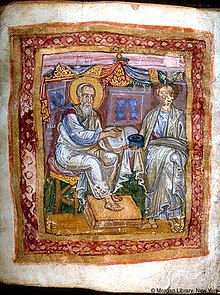Marcion of Sinope | |
|---|---|
 Apostle John (left) and (according to Eisler) Marcion of Sinope (right), from Morgan Library MS 748, 11th century.[1] | |
| Born | AD 85 |
| Died | AD 160 Roman Anatolia, Roman Empire |
| Notable work | Gospel of Marcion |
| Theological work | |
| Era | Patristic age |
| Tradition or movement | Marcionism |
| Main interests | Dualism, Nontrinitarianism |
Marcion of Sinope (/ˈmɑːrkiən, -siən/; Ancient Greek: Μαρκίων[2][note 1] Σινώπης; c. 85 – c. 160[3]) was a theologian[4] in early Christianity.[4][5] Marcion preached that God had sent Jesus Christ, who was distinct from the "vengeful" God (Demiurge) who had created the world.[4][5][6] He considered himself a follower of Paul the Apostle, whom he believed to have been the only true apostle of Jesus Christ; his doctrine is called Marcionism.[4][5][7] Marcion published the earliest record of a canon of New Testament books.[4][8]
Early Church Fathers such as Justin Martyr, Irenaeus, and Tertullian denounced Marcion as a heretic or antichrist,[9] and he was excommunicated by the church of Rome around 144.[10] He published his own canon of Christian sacred scriptures,[4][11][12] which contained ten Pauline epistles (including the Epistle to the Laodiceans, while excluding the Pastoral epistles) and the Gospel of Marcion which historically is claimed to be an edited version of the Gospel of Luke.[4][13] Some modern scholars, such as Matthias Klinghardt,[14] have theorized that Marcion's Gospel was the oldest, although this has been contested.
This made Marcionism a catalyst in the process of the development of the New Testament canon by forcing the proto-orthodox Church to respond to his canon.[4][15]
- ^ Eisler, Robert (1938). The Enigma of the Fourth Apostle, Methuen & Co.,p. 158, plate XIII).
- ^ First Apology of Justin Martyr, XXVI.5
- ^ Bradshaw, Robert. "Marcion: Portrait of a Heretic". EarlyChurch.org.uk.
- ^ a b c d e f g h Ehrman, Bart D. (2005) [2003]. "At Polar Ends of the Spectrum: Early Christian Ebionites and Marcionites". Lost Christianities: The Battles for Scripture and the Faiths We Never Knew. Oxford: Oxford University Press. pp. 95–112. doi:10.1017/s0009640700110273. ISBN 978-0-19-518249-1. LCCN 2003053097. S2CID 152458823.
- ^ a b c Dunn, James D. G. (2016). ""The Apostle of the Heretics": Paul, Valentinus, and Marcion". In Porter, Stanley E.; Yoon, David (eds.). Paul and Gnosis. Pauline Studies. Vol. 9. Leiden and Boston: Brill Publishers. pp. 105–118. doi:10.1163/9789004316690_008. ISBN 978-90-04-31668-3. LCCN 2016009435. S2CID 171394481.
- ^ BeDuhn 2015, p. 165.
- ^ Knox 1942, p. 7.
- ^ Westcott, Brooke Foss (1870). A general survey of the History of the Canon of the New Testament, during the first four centuries.
- ^ Kaatz, K.W. (2012). Early Controversies and the Growth of Christianity. Praeger Series on the Ancient World. ABC-CLIO. p. 44. ISBN 978-0-313-38360-1. Retrieved 2023-08-12.
- ^ Harnack 1921, p. 17.
- ^ Bruce 1988, p. 134.
- ^ Knox 1942, p. 19.
- ^ BeDuhn 2015, p. 166.
- ^ Matthias Klinghardt (2015) Das älteste Evangelium und die Entstehung der kanonischen Evangelien, Francke Verlag; Translated as Klinghardt, Matthias (2021). The Oldest Gospel and the Formation of the Canonical Gospels. Biblical Tools and Studies, 41. Vol. 1 & 2. Leuven: Peeters Publishers. ISBN 978-90-429-4310-0. OCLC 1238089165.
- ^ Knox 1942, p. 3.
Cite error: There are <ref group=note> tags on this page, but the references will not show without a {{reflist|group=note}} template (see the help page).